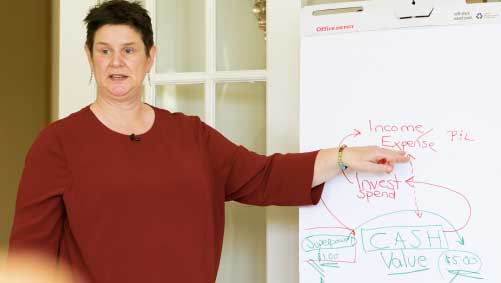
On a recent Facebook Live, someone commented, “I’ve been asking CFO* questions to CPAs* for years and not getting answers.”
*Definitions:
CFO = Chief Financial Officer
CPA = Certified Public Accountant
See my book “Your First CFO: The Accounting Cure for Small Businesses Owners” for more detail on these different roles.
And they were exactly right. Read on and let me explain why:
Tax accountants have critical work to do for you. Often, since taxes are the first financial problem a new business confronts, an owner will hire a CPA (aka tax accountant) for this job – and rightfully so!
But here’s the rub – they will also allow that CPA to select the first bookkeeper for the business.
And guess what? If the bookkeeper is hired by the tax accountant, they will set up the bookkeeping to support the tax accounting needs.
So, here’s the key — that bookkeeper, with just a little bit more information from you, could be creating meaningful, dashboard-type data in a language that makes sense to you as well.
So now with one investment, you are getting information that both helps you run the business and helps your tax accountant plan for and file your taxes. We’re gaining two ROIs with one bookkeeper. (Or, as my daughter says “Hugging two koalas with one arm.”)
Here is a perfect example:
I know it would be helpful for you to be able to know what’s happening with the cash in your bank account each month. But that level of detail is just not important to your tax accountant. So, what if your bookkeeping – that you’re already paying for anyway – was set up so that you could not only see that rise and fall of your bank balance – but predict it?
With one change the information you get from your bookkeeper will make much more sense to you and begin to answer your important business questions.
And what is that change?
Tell your bookkeeper your perspective on these three things and then tell them to use their bookkeeping tools to start reporting it to you based on that perspective:
- What you sell in your business – and how you group it in your head
- What your business pays for – and how you group it in your head
- Who you sell to and how you categorize them in your head
And thus, with the tools available to today’s bookkeepers, they can use that information to create reports that make sense to you the way you think about your business.
Here’s a great example for reference:
- I sell things in these groups:
- One-on-one fractional CFO services
- CEO coaching services
- Bookkeeping
- A One-of-A-Kind Mastermind
- I pay for these major categories of inputs:
- Employees
- Contractors
- Software
- Travel
- Sponsorships
- I sell to these groups:
- $8-figure businesses
- $6-7 figure businesses
- Just starting out entrepreneurs
That’s it – that’s all you have to do. Just share your language with your bookkeeper; you will limit the amount of time you have to spend interpreting reports that make no sense while exploding exponentially the value you get from your bookkeeping.





